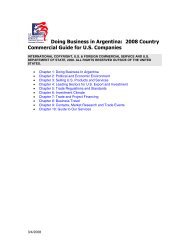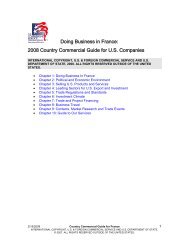Doing Business In Saudi Arabia - Bna
Doing Business In Saudi Arabia - Bna
Doing Business In Saudi Arabia - Bna
You also want an ePaper? Increase the reach of your titles
YUMPU automatically turns print PDFs into web optimized ePapers that Google loves.
5/13/2008<br />
Environmental Control Department tests foodstuffs at the point of sale for product<br />
safety standards.<br />
The Communications and <strong>In</strong>formation Technology Commission (CITC) also has<br />
authority on imported telecommunications and IT products and services.<br />
Recently, the CITC has taken a more proactive role and has published a number<br />
of technical specifications relating to various products and services within its<br />
jurisdiction.<br />
Conformity Assessment Return to top<br />
Since its inception in 1995, the certification program known as the ICCP was<br />
applicable to 66 regulated products. The purpose of the program was to insure<br />
consumer protection and that products entering <strong>Saudi</strong> <strong>Arabia</strong> conform to SASO<br />
standards. SASO was in charge of implementing and monitoring the<br />
<strong>In</strong>ternational Conformity Certification Program (ICCP). They have done so<br />
through an agreement with <strong>In</strong>tertek, which has global presence.<br />
Under its WTO commitments, <strong>Saudi</strong> <strong>Arabia</strong> will comply with all obligations under<br />
the WTO Agreement on Technical Barriers to Trade from the date of accession,<br />
and without recourse to any transition period. As such, <strong>Saudi</strong> <strong>Arabia</strong> has<br />
committed to remove the mandatory, pre-market approval requirements for<br />
imports (ICCP) and to implement a non-discriminatory, post-market surveillance<br />
mechanism applicable to both foreign and domestic product at no cost to<br />
suppliers. As of the date of this report, <strong>Saudi</strong> <strong>Arabia</strong> still mandates that a<br />
Certificate of Conformity (CoC) must accompany all consumer goods exported to<br />
<strong>Saudi</strong> <strong>Arabia</strong>. Exceptions include food products, medical products including<br />
medicines, medical equipment, and components/products of large industrial<br />
projects.<br />
The Ministry of Commerce and <strong>In</strong>dustry has taken responsibility for the<br />
Certificate of Conformity (CoC) program under the jurisdiction of Dr. Hamad Al-<br />
Oufi, Director General for Quality Control & <strong>In</strong>spection, and who can be reached<br />
at (966 1) 401-3265, Fax: (966 1) 402-2539.<br />
Product Certification Return to top<br />
<strong>In</strong> <strong>Saudi</strong> <strong>Arabia</strong>, SASO will set up its own certification organization for locally<br />
manufactured products, as several SASO employees have been certified to work<br />
as professional auditors in conformance with ISO 9000 series standards.<br />
For imported products, the Ministry of Commerce and <strong>In</strong>dustry will implement the<br />
CoC program, which should be abolished under <strong>Saudi</strong> <strong>Arabia</strong>’s WTO accession<br />
commitments.<br />
For beef and poultry meat imported from the United States, <strong>Saudi</strong> <strong>Arabia</strong> has<br />
agreed to recognize a two-certificate approach: (1) an official FSIS export<br />
certificate issued for beef and poultry meat and (2) a producer or manufacturer












